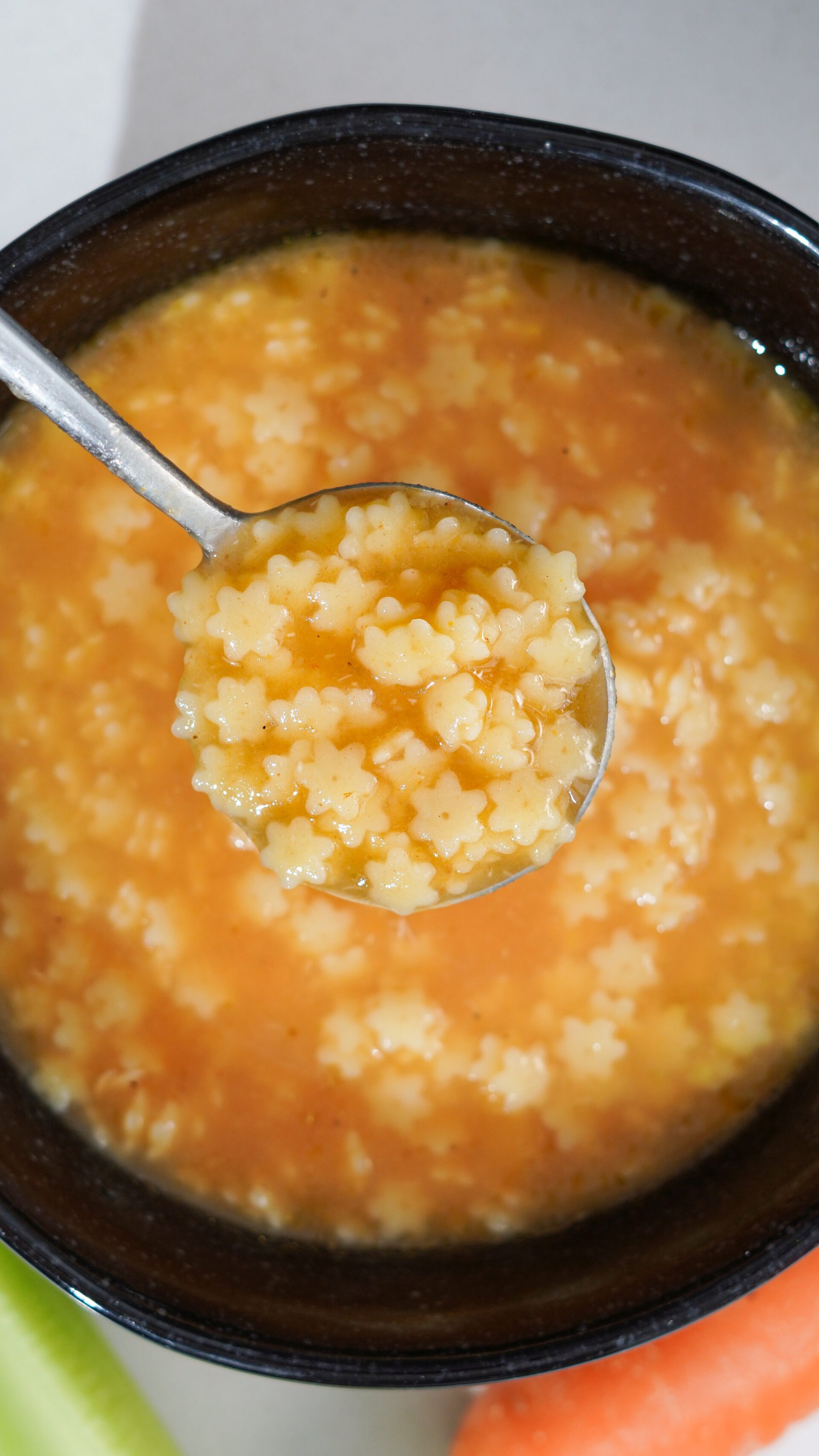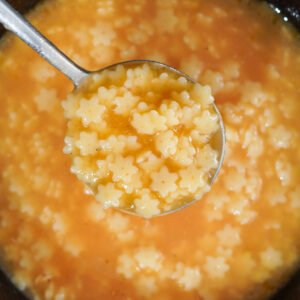This dish is pure comfort in a bowl. Pastina, meaning “small pasta” in Italian, is a beloved recipe that warms the soul while nourishing the body. It’s a perfect way to use up leftover vegetables and transform them into something truly special.
The magic starts with creating a homemade vegetable stock by simmering carrots, celery, onion, and potato. Once softened, these veggies are blended into a creamy purée, which is mixed back into the broth with the tiny, tender pastina. The result is a velvety, flavour-packed dish that’s as nutritious as it is nostalgic.
Top it off with a drizzle of extra virgin olive oil and grated Parmesan for the ultimate finishing touch. Whether you’re feeling under the weather or simply craving a wholesome meal, this recipe brings a taste of Italian childhood to your kitchen.

What is ‘Pastina’?
Pastina is a type of tiny pasta, often used in Italian home cooking. The name literally means “little pasta” in Italian. Pastina is usually made with homemade vegetable stock—especially when served to children or as a nourishing, light meal.
In many Italian households, pastina in brodo (pastina in broth) is the first “solid” food for toddlers and a go-to meal when someone is sick—usually with a bit of butter and grated parmesan stirred in at the end. It’s warm, gentle, and nostalgic.
How to Make a Quick and Easy Vegetable Stock
- Peel the carrots, potatoes and onions and roughly chop them into cubes.
- Add to a large saucepan, add water (800ml-1l but you can always add more if needed) and bring to boil. Add the tomato paste and season to taste with salt and pepper.
- One the vegetables are soft remove them from the water with a colander or spoon, but keep the water! It has now become a delicious homemade vegetable stock.
- Transfer the vegetables to a bowl and blend with hand blender.
Tips
- The stock quality is essential: whether it’s homemade or a good-quality cube, the flavour of the broth really matters—it’s the heart of the dish.
- Cook the pastina directly in the broth: this lets it absorb flavour as it softens, and saves you washing up.
- Don’t overcook: these tiny shapes cook fast—check after 4–5 minutes so they stay tender, not mushy.
- A little grated parmesan, a drizzle of olive oil, or a small knob of butter at the end gives richness and that comforting, silky texture, it’s a must!
Swaps
Pastina: Can’t find pastina? Use orzo, quinoa, millet,
Broth: traditionally this recipe uses vegetable broth but you could swap for chicken broth, bone broth, or a miso broth for a deeper umami note.
Parmesan cheese (optional for the topping): use nutritional yeast (for dairy-free)
Storage
Fridge:
Let the broth cool completely, then store it in a sealed container for up to 4 days. Reheat gently on the hob when needed.
Freezer:
It freezes beautifully (but the ‘pastina’ might overcook slightly when re-heated). Pour into containers or ice cube trays for portioning, and freeze for up to 3 months (label with the date and leave room at the top of the container for expansion)
More Soups When You Are Feeling Under the Weather
- Gut Health Soup
- Ribollita (Italian Vegetable & Bread Soup)
- Pasta e Fagioli (Italian Pasta & Bean Soup)

Pastina
Ingredients
- ~100g pastina
- 1 small carrot
- ½ celery stick
- ½ small onion
- ½ small potato
- 1 tbsp tomato paste
- salt & pepper to taste
Instructions
- Peel the carrots, potatoes and onions and roughly chop them into cubes.
- Add to a large saucepan, add water (800ml-1l but you can always add more if needed) and bring to boil. Add the tomato paste and season to taste with salt and pepper.
- One the vegetables are soft remove them from the water with a colander or spoon, but keep the water! It has now become a delicious homemade vegetable stock.
- Transfer the vegetables to a bowl and blend with hand blender.
- Add the pastina to the pan and cook for 5-6 minutes or until the pastina is ready.
- Pour the vegetable purée back into the pan and mix. You’ll get the most gorgeous creamy and nourishing result.
- Serve with grated Parmesan cheese and a drizzle of good quality extra virgin olive oil.
